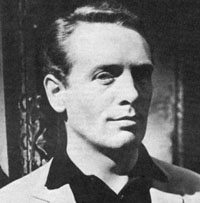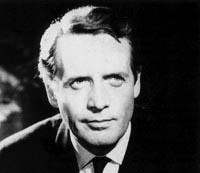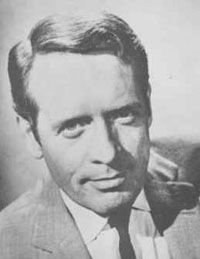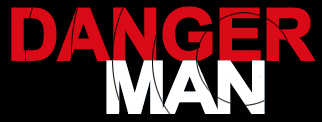John Drake - The Character [Back to the homepage]
This pages looks at how the charatcer of John Drake evolved over the four series
|
The Early Drake
|

|
We first see John Drake as an idealistic young operative working for NATO. The brevity of these earlier episodes allows for little character development; the pace is necessarily fast, the emphasis is on action. However, it is quite evident from the start that here is a man with a strong sense of morality, used to working alone. He is spectacularly handy with his fists, and rarely carries let alone uses a firearm. Given the choice he prefers to talk his way out of a tricky situation, but failing that he is quite capable of routing the enemy single-handedly. This young Drake is brutally efficient - he is there to get the job done with a minimum of fuss and bother. Only rarely does he question the nature and ethics of his assignments. When doubts do assail him, he is more likely to act as he sees fit rather than argue the point with his employers.
Physically, Drake is very attractive. He is tall, well dressed and clean-cut. Although these episodes are black and white only, the clarity and intensity of his icy blue gaze is unmistakable and the viewer receives the impression that this young spy can indeed read his adversaries' wicked minds. His accent is a curious blend of American and Irish, his diction clipped and precise. When asked his origins Drake usually refers to himself as an American although more often than not he eludes the question.
|
Despite his admission that he lacks a formal tertiary education, John Drake is extremely accomplished in languages, politics and the ins and outs of high society. He is adept, as any spy worth his dark glasses should be, at disguising his appearance and accent; equally believable in black tie and tails at the Minister's table, sporting straw hat and tan in the Mexican wilderness, or tweeds and brogue in the Scottish Highlands.
The 'real' Drake seems to prefer well-cut suits and an interesting array of hats. He shows a talent or at least an interest in the piano and an enviable knowledge of food and wine. On those odd occasions that he does relax, his wardrobe is conservative. On vacation he is more likely to go photographing wolf cubs or trekking through the jungle than taking in a movie and redecorating the home. His cynical sense of humour is honed to a point though rarely do we see him laugh or smile in genuine amusement.
"In DM there is action, a lot of action, but never any gratuitous violence. If a man dies it is not just another cherry falling off the tree. When Drake fights, it is a clean fight. He has a horror of bloodbaths and though he carries a revolver he only uses it in cases of absolute necessity. He does not shoot to kill..." Quoted by Dave Rogers, Top Secret, vol. 1, no. 1, August 1985.
It is refreshing to see a character who deals with the shadier side of this world, displaying such a healthy respect for life. This is not to say he never kills, but when he does it is always in the heat of battle and unavoidable. Drake's cool attitude toward the many sirens thrown his way is also unusual. Possibly the nature of his profession fosters the mistrust he exhibits in the presence these alluring young women, who flock to his side like moths to the candle. After all, fifty percent of them are revealed as villainous sorts by the episode's end and his is not the lifestyle that settles well with marriage and a family. Whatever the reason, many of the women are background only and never come close to scratching that polished exterior.
Drake circles these woman like a wary shark, curious but maintaining his distance. Occasionally we see him lower his guard momentarily but at the slightest hint of familiarity on the part of that week's beauty, up it slams. Drake apparently views women as potential enemies, rather than companions and doesn't seem able to or willing to allow any philandering during the course of his assignments. His behaviour towards them isn't exactly misogynistic but it comes close.
|
|
Drake's Transition
|

|
Several changes occurred in both the format of the episodes and Drake's character between series one and two. The motivations behind these alterations are mentioned below.
"Drake is now less cold, less perfect, less infallible and he behaves in a much more human way. He can make mistakes and is more likeable." Ralph Smart
"Drake now finds himself emotionally involved in his relations with other characters. Maturity has given him a greater understanding of others." Patrick McGoohan
|
"The broader conception of the character is accompanied by a greater depth in the approach to his job. The scripts tackle the professional aspects of espionage, as well as its political character. They take their bearings from developments that have taken place in a world that has changed radically since the first series was produced. One thing has not changed: the action. Tension and suspense are key words of scripts that do justice to the title: the accent is on danger." Quoted in the ITC's production company's press file.
Regardless of the above comments, I don't think the changes are pronounced. Drake may have matured and changed employment but he is still an enigmatical and unapproachable character. True, we do see him with old friends and in one case an Uncle, and it is on these rare occasions that the loyal and possibly more vulnerable Drake peeps his head above water.
|
|
The Later Drake
|

|
By the Second Season Drake has matured, both in appearance and character. The length of these episodes allows us a greater insight into the man. He retains his integrity and sense of duty, but now we see him begin to question the judgment of his stuffy superiors in M9, a secret governmental department. It's Up to the Lady is only one of several episodes that show Drake at loggerheads with his anonymous employers. He is now more likely to labour the point if he is unhappy with the state of affairs, and isn't beyond taking his peers down a peg or two if he feels such a move is warranted. He is more arrogant and sure of his position within the Service. After all, like James Bond, he is one of their best men and occasionally he uses that to his advantage.
Although he often refers to himself as 'a citizen of the world', Drake's clipped accent has become unmistakably British and his apparel (tasteful suits and trilbies) equally so.
In contrast to the heady whirl of Series one, these episodes proceed at a more leisurely pace. Dialogue receives due attention, action becomes more an adjunct than a necessity and the storylines have increased depth. There is even time for experimentation. In The Ubiquitous Mr Lovegrove we are granted a glimpse into Drake's fevered mind when he suffers a driving mishap. Exotic imagery and a jumbled plot provide any would-be psychoanalysts with rich fodder.
|
The older Drake still views women with suspicion, but now he seems capable of flirtation, albeit spiced with a dash of cynical detachment. Perhaps his biological clock is ticking and he sees in these women a potential mate. If so, he suppresses the urge well. By the end of the series Drake is still walking tall and alone.
Several of the most amusing moments in the series arise when Drake encounters his match in the female of the species; icy calm flees to be replaced by an hilarious schoolboy confusion. You're Not in Any Trouble Are You? is riddled with 'Danger Man's' unique brand of humour. In this episode the viewer sees Drake plagued by uncharacteristic doubt and a very persistent young lady, as he seeks to expose an international assassination bureau before he becomes its next victim.
I find it fascinating that in the course of the series, Drake never ventures beyond two or three chaste pecks on a well-groomed cheek or the occasional brief asexual embrace. Only once do we see him grapple with temptation, in The Black Book, and it is a brief struggle at that. In later episodes however, Are You Going to be More Permanent? and To Our Best Friend Drake hints at an unexpected regret that a wife and family are beyond his reach.
Patrick McGoohan has been reported as saying that if he kissed a woman in one episode, the public would expect him to do the same in every episode. He wasn't prepared to encourage promiscuity. He held similar views on the depiction of extreme violence, which may well explain how this secret agent survived an entire series without actually shooting anyone to death.
|
|

